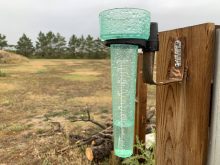Norm Flaten could be excused for wanting to say, “I told you so.”
The former president and chief executive officer of Weyburn Inland Terminal was one of the casualties in the war over the terminal’s future earlier this year.
Now he watches as the new executive and management team at WIT embark on a strategic direction similar to the ill-fated plan that cost him his job.
“Quite frankly, I feel vindicated,” Flaten said last week in an interview from his farm near Weyburn, Sask. “I guess it wasn’t such a terrible idea after all.”
Read Also

Saskatchewan firm aims to fix soil with compost pellets
In his business, Humaterra, Leon Pratchler is helping farmers maximize yields in the weakest areas of their fields through the use of a compost pellet.
The idea was to try to secure the terminal’s continued viability and prosperity by entering into some sort of partnership with a large well-established grain company.
The proposal brought forward last fall was for an equity investment in WIT by United Grain Growers. But that was abandoned in the face of opposition from shareholders who wanted the terminal to remain independent and farmer-owned.
Executives fired
Before the dust had settled Flaten and two other members of WIT’s executive team had been fired and another had resigned.
This spring, a battle erupted for control of WIT. One faction of shareholders said they should have the right to sell their shares to the highest bidder, even if that meant selling out to another grain company. The other said it was committed to WIT remaining independent.
At the company’s annual meeting in April, the slate of independent candidates won the day.
Weyburn’s new president Claude Carles said unlike past proposals, this agreement doesn’t give UGG any ownership in WIT.
“We just felt we had excess capacity that we could offer to someone else in a business relationship, like the terminals do at Thunder Bay or Vancouver,” he said. “The whole idea started that way before as well, but it got sidetracked on the equity issue. That’s when things derailed.”
Flaten, who still owns shares and delivers grain to WIT, said his old executive team felt an agreement that involved an equity investment by the partner would be more solid and provide more benefits to WIT.
But he said the economic advantages were lost in the political debate: “We didn’t sell it very well.”
Russ Jeffrey, marketing manager for UGG, said UGG is just as happy with the handling agreement as it would have been with the equity investment that was rejected by shareholders.
“When they changed direction and wanted more of a straightforward handling arrangement, we just approached it from a fresh slate,” he said. “We needed more capacity and that still fit. It’s the same result in the end.”
He added that UGG has no intention of pursuing any sort of takeover of WIT.
Both Flaten and Carles say they hope the battles of the past year can be set aside and everyone can work together to move as much grain as possible to benefit both farmers and shareholders.














